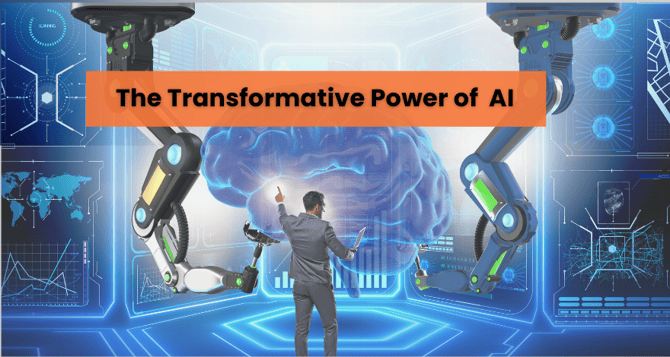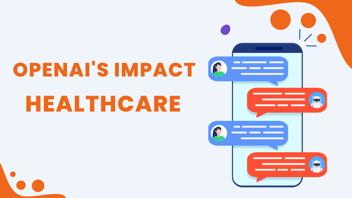AI Revolution in Healthcare: Transforming the Industry
This article delves into the current AI revolution in healthcare, illustrating its profound impact on transforming the industry. By exploring the innovative applications of artificial intelligence, the piece highlights how this technology is reshaping healthcare practices, processes, and outcomes, ushering in a new era of advancement and efficiency in the field.

For a very long time, the forefront of technological innovation has been the healthcare sector. Artificial Intelligence (AI) has revolutionized patient diagnosis, treatment, and care in recent years by greatly enhancing the capabilities of healthcare professionals. AI is revolutionizing the healthcare industry with its speedy and accurate analysis of large amounts of data.
The Role of AI in Healthcare:
1. Medical Imaging:
AI has advanced medical imaging tremendously. AI algorithms can now help radiologists identify anomalies in X-rays, MRIs, and CT scans. These algorithms aid in the early identification of illnesses like cancer, improving the efficacy of treatment.
2. Disease Diagnosis:
By examining patient data, AI is being utilized more and more to diagnose illnesses. To make more precise diagnoses, machine learning models can examine a patient's test results, medical history, and symptoms. This guarantees the right course of treatment and lowers the possibility of a misdiagnosis.
3. Drug Discovery:
The conventional method of finding new drugs is costly and time-consuming. By examining enormous databases of chemical compounds to find promising drug candidates, AI can speed up this process. Additionally, it enhances clinical trial optimization, increasing the effectiveness of drug development.
4. Personalized Medicine:
AI makes it possible to create individualized treatment programs. AI can suggest personalized treatments based on a patient's genetic profile, medical history, and lifestyle choices, increasing the likelihood of positive results.
5. Patient Management:
AI can significantly enhance patient management. EHR for mental health settings is a specific application that benefits greatly from AI capabilities, helping providers manage appointments, organize sensitive data, and provide better anticipatory care. These AI-enhanced systems streamline workflows for mental health professionals, ensuring they can effectively serve their communities while maintaining high standards of privacy and compliance.
Challenges and Concerns:
While AI has the potential to completely change healthcare, there are also some problems and drawbacks:
1. Data Security and Privacy:
Data security and privacy are major concerns because AI applications require a large amount of patient data. Ensuring sufficient protection for sensitive patient data is imperative.
2. Regulatory Compliance:
The healthcare industry is highly regulated, and incorporating AI into the field necessitates adherence to a number of laws and rules, including HIPAA in the US. It is crucial to make sure AI systems adhere to these specifications.
3. Ethical Considerations:
AI decisions are susceptible to bias, and the potential effects of AI algorithms on patient care and outcomes raise ethical questions. It's critical to guarantee fairness and openness in AI systems.
4. Lack of Standardization:
The successful application of AI in healthcare may be hampered by the absence of standardized data formats and interoperability across healthcare systems.
Future of AI in Healthcare:
AI in healthcare has a bright future. As technology develops further, we can anticipate:
1. Increasing Automation:
Healthcare workers will be able to concentrate on more intricate parts of patient care as a result of an increase in automation of tasks like patient monitoring, administrative work, and even some surgical procedures.
2. Improved Diagnosis and Treatment:
Artificial intelligence will keep raising the bar for diagnosis precision and treatment suggestions, which will benefit patients.
3. Telemedicine and Remote Monitoring:
AI will be crucial to remote healthcare, enabling patients to receive treatment in the convenience of their own homes. Vital signs can be tracked by AI-powered monitoring devices, which can also provide early alerts for health problems.
4. Research and Development:
AI will speed up genomics research, drug discovery, and the creation of new medical technologies, resulting in significant advancements in the field of medicine.
Conclusion:
By enhancing patient care, diagnosis, and treatment, artificial intelligence is completely changing the healthcare industry. Even though there are obstacles to overcome, there are a tonne of possible advantages.
Elevate Your Business with Custom AI Solutions
Our AI development services offer a tailored approach to meet your specific business needs. Let's discuss your project today!
AI will become more and more important in determining the direction of healthcare in the future, which will eventually result in improved patient outcomes and more effective healthcare systems. AI should be further leveraged by the healthcare sector in partnership with the technology industry to improve human health.













